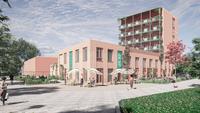
Amsterdam
Amsterdam is one of the cities in the research project Circular grassroots innovations for sustainable and inclusive urban transitions.
Amsterdam is facing an increasingly severe housing crisis, the result of liberalising social housing provisioning and promoting mortgaged homeownership (Wijburg, 2021). In recent years, the municipality of Amsterdam has been more active in combatting these tendencies and has in this context launched the so-called ‘Action Plan Housing Cooperatives’, which seeks to realise 15 to 20 housing cooperatives within 4 years, with the ultimate goal of realising 10% of the housing stock being cooperatively-owned by 2050. A housing cooperative (Dutch: wooncoöperatie) is a form of collective housing, whereby a cooperative (of residents) either owns or manages the building, taking decisions democratically, while the amount of shared spaces and the closeness of the community may vary (timetoaccess.com).
Our project explores and works with one of the first of many grassroots initiatives that has emerged following this call: De Nieuwe Meent, a housing cooperative in the East of Amsterdam, called ‘De Nieuwe Meent’, that is on the verge of being completed after a 6-year participatory planning process with radical architects from ‘Time to Access’. It builds specifically on values of diversity, sustainability, the commons and care. Indeed, the Dutch word ‘meent’ is an old world for the commons.
Examining this pilot cooperative is an excellent way of examining the potential of such initiatives in enabling circular and shared ways of housing and living. It also allows to consider the extent to which these initiatives manage to build durable and affordable alternatives to the capitalist housing market, therefore providing a way to escape the housing crisis from the grassroots. We explore these questions in the context of post-growth and/or post-capitalist ideals.
We explore these questions by focusing on
- Infrastructures (both material and immaterial) that underpin the functioning of the cooperative, and whose elaboration we view as being subject to both outside pressures (e.g. finances) and internal processes of continuous adaptations.
- Cultural politics and issues of attachment and detachment in particular, that we deem crucial to understanding the ways in which ideals of circularity, sharing and commoning are practiced in the organisation of and daily life in the cooperative.
The project is developed in close cooperation with the radical architect collective ‘Time to Access’, who have been integral to the planning and project management of De Nieuwe Meent and who are particularly well-versed in participatory and co-productive modes of doing architecture.
This project is led by two researchers:
Federico Savini, Associate Professor in Environmental Planning, Institutions and Politics and PI of the project
Elisa Schramm, Postdoctoral Researcher in Urban Planning dedicated full-time to this project.








